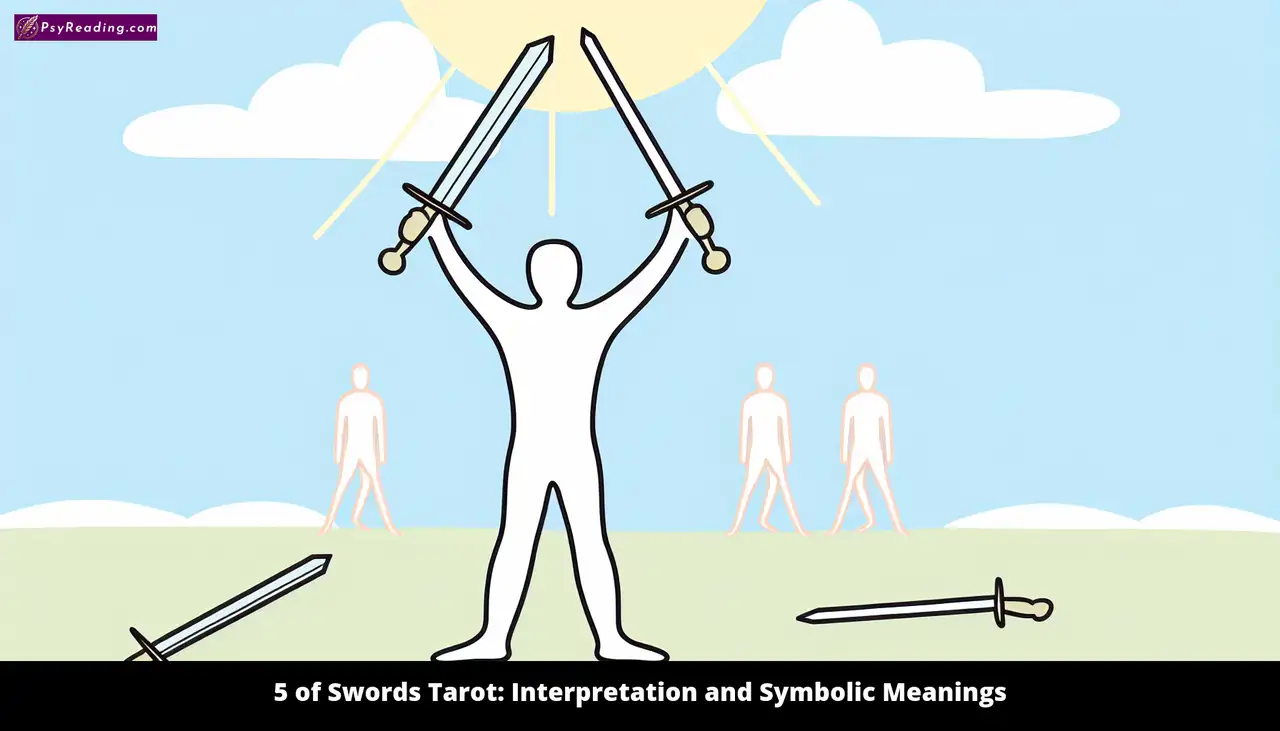The 5 of Swords Tarot card symbolizes conflict, tension, and defeat, often indicating a period of struggle in one’s life. Despite its challenging nature, this card offers valuable insights into personal and relational dynamics, guiding individuals through trials and tribulations. This article explores the interpretation and symbolic meanings of the 5 of Swords Tarot card, providing clarity for those seeking answers.
Whether you’re curious about the five of swords in love or its broader tarot symbolism, this guide illuminates the path ahead. Known also as the V of Swords, this card encompasses themes of self-awareness, personal growth, and potential transformation, beyond mere conflict and defeat.
Join us as we delve into the intricate world of the 5 of Swords Tarot, exploring its symbolism, role in love readings, and practical applications in daily life. Discover the profound wisdom that the 5 of Swords has to offer, whether you’re a seasoned tarot reader or a curious novice.
Contents
- 1 What is the Meaning and Symbolism of the 5 of Swords in Tarot?
- 2 How is the Five of Swords Interpreted in a Tarot Reading?
- 3 How Does the Five of Swords Influence Love and Relationships?
- 4 How Does the Five of Swords Relate to Personal Growth?
- 5 How Does the Five of Swords Affect Career and Work?
- 6 What is the Psychological Interpretation of the 5 of Swords?
- 7 How Does the Five of Swords Influence Decision Making?
- 8 What Role Does the Five of Swords Play in Predicting Future Events?
- 9 What are the Positive Interpretations of the 5 of Swords?
- 10 How Does the Five of Swords Relate to Conflict Resolution and Peace?
What is the Meaning and Symbolism of the 5 of Swords in Tarot?
The 5 of Swords represents conflict, tension, and defeat. It often indicates situations where power struggles occur, leading to a sense of loss or resentment. This card encourages introspection, highlighting the costs of winning at all costs and the importance of resolving disagreements thoughtfully.
Symbolically, the card depicts a figure holding swords, suggesting the aftermath of conflict. It serves as a reminder that victory gained through questionable means can have lasting negative effects on relationships and personal integrity.
How is the Five of Swords Interpreted in a Tarot Reading?
In a tarot reading, the Five of Swords signifies conflict, tension, and the potential for defeat. It suggests that the querent may be involved in a situation where assertiveness or dominance is causing friction.
The card advises considering the consequences of one’s actions and striving for resolution rather than seeking to win at all costs. It highlights the need for compromise and understanding to navigate challenging circumstances effectively.
How Does the Five of Swords Influence Love and Relationships?
The Five of Swords in love readings indicates power struggles or a win-at-all-costs attitude within a relationship. It may suggest manipulation or deceit, signaling an imbalance that needs to be addressed.
This card encourages open communication and reassessment of relationship dynamics to restore harmony. It highlights the importance of resolving conflicts to build a healthier, more balanced connection.
How Does the Five of Swords Relate to Personal Growth?
The Five of Swords relates to personal growth by highlighting lessons learned through conflict and adversity. It encourages individuals to reflect on their actions and the impact they have on others.
By confronting and understanding their struggles, individuals can develop resilience and self-awareness. This card emphasizes growth through overcoming challenges and learning from past mistakes.
How Does the Five of Swords Affect Career and Work?
In a career context, the Five of Swords signifies tension, competition, or conflict in the workplace. It may indicate office politics, disagreements with colleagues, or a competitive environment.
The card advises strategic thinking and diplomacy to navigate these challenges. It suggests that cooperation and clear communication are essential to overcoming workplace conflicts and achieving professional success.
What is the Psychological Interpretation of the 5 of Swords?
Psychologically, the 5 of Swords represents internal conflicts, such as struggles with one’s ego or moral dilemmas. It reflects feelings of guilt, regret, or isolation resulting from one’s actions.
This card encourages self-reflection and reassessment of one’s motivations and behaviors. It highlights the importance of addressing internal struggles to achieve emotional well-being and personal integrity.
How Does the Five of Swords Influence Decision Making?
The Five of Swords influences decision-making by urging caution and strategic planning. It warns against hasty actions driven by the desire to win, suggesting that such behavior may lead to negative consequences.
This card encourages thoughtful consideration of options and the potential impacts of decisions. It advocates for balancing assertiveness with empathy to make choices that foster long-term success and positive relationships.
What Role Does the Five of Swords Play in Predicting Future Events?
In predicting future events, the Five of Swords suggests upcoming challenges involving conflict or competition. It indicates that the querent may face situations requiring strong resolve and strategic thinking.
While the card points to potential struggles, it also highlights opportunities for growth and learning. By preparing for conflicts and approaching them wisely, individuals can navigate future challenges effectively.
What are the Positive Interpretations of the 5 of Swords?
Despite its association with conflict, the Five of Swords has positive interpretations. It signifies resilience, personal strength, and the ability to overcome adversity.
The card encourages learning from difficult experiences and using those lessons to grow. It highlights the potential for transformation and the development of greater self-awareness through facing challenges head-on.
How Does the Five of Swords Relate to Conflict Resolution and Peace?
The Five of Swords relates to conflict resolution by emphasizing the need for fair and peaceful outcomes. It warns against seeking victory at the expense of others and promotes finding mutually beneficial solutions.
This card encourages forgiveness, understanding, and open communication to resolve disputes. It underscores the importance of restoring harmony and building respectful relationships after conflict.

